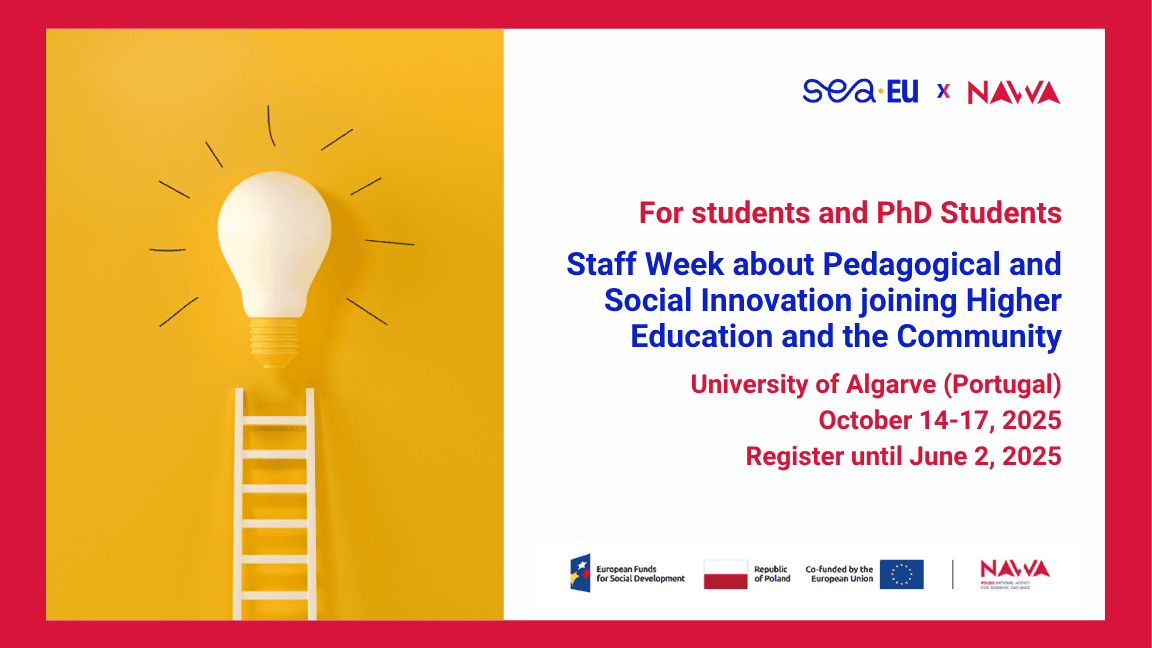Recruitment rules for International Mobility within the SEA-nergy Project
BASIC INFORMATION
Name
Staff week: Gender(ed) Landscapes
Objective
The purpose of participating in the event is to deepen reflection on gender as a significant social phenomenon through an interdisciplinary approach to the subject. The event also seeks to create
a space for the exchange of knowledge, critical analysis, and collaboration among participants in order to jointly explore how gender identities are shaped, challenged, and interpreted across various fields and social practices. The program also aims to highlight the evolving role of gender in academia and society.
Destination and duration of mobility
The international mobility will be conducted at SEA-EU’s partner university, University of Split from October 8th to October 10th 2025.
Detailed program
https://sea-eu.org/wp-content/uploads/2025/02/Gendered_Landscapes_Staff_Week_FIN.pdf
Set of learning outcomes (competencies):
- The ability to critically analyze and reflect on issues related to gender and identity.
- The ability to initiate and develop international collaboration in the academic environment.
- Communication and practical skills related to issues of equality and inclusivity.
Learning outcomes:
- Knowledge:
1.1 has in-depth knowledge of the role of gender as an analytical category across various academic disciplines and understands how gender shapes identities and social spaces in academic and cultural contexts.
1.2 is familiar with best practices and models of international collaboration in higher education, particularly within the SEA-EU network, and understands their significance for the development of educational and research projects.
1.3 has up-to-date knowledge of contemporary trends and debates related to equality, diversity, and inclusivity, particularly in the context of the role of gender in modern academic and social discourse. - Skills:
2.1. is able to analyze and interpret issues related to gender and identity from an interdisciplinary perspective, combining approaches from various fields of science, art, and social practices.
2.2. is able to establish and develop international collaboration in the academic environment, drawing on the experiences of institutional partnerships and planning joint educational and research initiatives.
2.3. has the ability to actively participate in workshops, discussions, and conference sessions, formulating reflections and arguments in a conscious, inclusive manner that is adapted to a culturally diverse environment. - Social competencies:
3.1. is open to cultural, social, and ideological diversity and is able to function in an international, multilingual, and diverse academic environment with respect for the principles of equality and inclusivity.
3.2. demonstrates a readiness for critical reflection on the social and cultural conditions related to gender, engaging in dialogue and collaboration with representatives from diverse backgrounds and disciplines.
3.3. is able to build constructive professional and inter-institutional relationships by actively participating in SEA-EU network initiatives and promoting the values of collaboration, mutual understanding, and social responsibility.
Criteria for assessing learning outcomes:
| Learning outcome | Verification criteria | Form of verification |
| 1.1. has in-depth knowledge of the role of gender as an analytical category across various academic disciplines and understands how gender shapes identities and social spaces in academic and cultural contexts | 1.1.1. is able to present and discuss examples of the application of the gender category in the analysis of social, cultural, or academic phenomena during discussions, presentations, or workshops 1.1.2. demonstrates an understanding of the impact of gender on the shaping of identities and social spaces, formulating accurate and knowledge-based reflections during thematic classes or conference sessions | Test |
| 1.2. is familiar with best practices and models of international collaboration in higher education, particularly within the SEA-EU network, and understands their significance for the development of educational and research projects | 1.2.1. is able to identify and describe specific examples of best practices and models of international collaboration carried out within the SEA-EU network 1.2.2. explains how international collaboration influences the development of educational and research projects, presenting this knowledge during discussions or bilateral meetings | Test |
| 1.3. has up-to-date knowledge of contemporary trends and debates related to equality, diversity, and inclusivity, particularly in the context of the role of gender in modern academic and social discourse | 1.3.1. is able to identify and discuss the most important contemporary trends and key debates concerning equality, diversity, and inclusivity in the context of gender during conference sessions or workshops 1.3.2. demonstrates the ability to engage with current academic and social discussions on the role of gender, presenting informed and knowledge-based arguments during classes and discussions | Test |
| 2.1. is able to analyze and interpret issues related to gender and identity from an interdisciplinary perspective, combining approaches from various fields of science, art, and social practices | 2.1.1. presents an analysis of a selected issue related to gender and identity, incorporating perspectives from various disciplines such as social sciences, humanities, art, and social practices 2.1.2. is able to integrate diverse theoretical and methodological approaches in interpreting gender-related issues, presenting coherent conclusions during workshops, presentations, or discussions | Test |
| 2.2. is able to establish and develop international collaboration in the academic environment, drawing on the experiences of institutional partnerships and planning joint educational and research initiatives | 2.2.1. actively participates in meetings with representatives of partner universities, demonstrating readiness to collaborate and sharing institutional experiences 2.2.2. formulates proposals for joint educational or research initiatives, taking into account the opportunities and needs of international collaboration within the SEA-EU network | Test |
| 2.3. has the ability to actively participate in workshops, discussions, and conference sessions, formulating reflections and arguments in a conscious, inclusive manner that is adapted to a culturally diverse environment | 2.3.1. speaks up during workshops, discussions, or conference sessions, presenting reflections and arguments in a clear, informed, and knowledge-based manner 2.3.2. formulates statements with respect for cultural and ideological diversity, using inclusive language that is open to different perspectives | Test |
| 3.1. is open to cultural, social, and ideological diversity and is able to function in an international, multilingual, and diverse academic environment with respect for the principles of equality and inclusivity | 3.1.1. demonstrates an attitude of openness and respect toward different cultures, views, and experiences when collaborating with participants from various countries and academic environments 3.1.2. actively participates in activities conducted in an international environment, communicating in a manner adapted to a multilingual context and adhering to the principles of equality and inclusivity | Test |
| 3.2. demonstrates a readiness for critical reflection on the social and cultural conditions related to gender, engaging in dialogue and collaboration with representatives from diverse backgrounds and disciplines | 3.2.1. actively engages in dialogue among representatives of diverse backgrounds and disciplines, formulating questions and comments related to the social and cultural aspects of gender 3.2.2. demonstrates a reflective attitude by critically analyzing presented content and phenomena related to gender, both in discussions and during workshop or conference activities | Test |
| 3.3. is able to build constructive professional and inter-institutional relationships by actively participating in SEA-EU network initiatives and promoting the values of collaboration, mutual understanding, and social responsibility | 3.3.1. establishes and maintains professional contacts with representatives of partner universities, demonstrating commitment to the activities of the SEA-EU network 3.3.2. promotes attitudes based on collaboration, mutual understanding, and social responsibility by actively participating in inter-institutional and team initiatives | Test |
Criteria for assessing learning outcomes:
REQUIREMENTS FOR MOBILITY
Participants of the mobility
To apply for the mobility, candidate must be an active PhD student of the University of Gdańsk on the day of applying for the recruitment process and the planned mobility. Applicants are not allowed to be on any type of leave.
The participant’s declared English language level is a minimum of B2.
Recruitment
All candidates are required to complete a special registration form at: https://forms.office.com/e/cGLfxBV0RP One of the elements of the application form is a cover letter justifying the choice of mobility which should raise the candidate’s competence. The form must be completed and submitted by June 9th, 2025.
The order of funding allocation depends on the total number of points obtained – applications with a higher total score will have priority in funding allocation and will be processed according to the ranking list.
Those who have submitted a complete set of required documents and meet the mobility requirements may be qualified to participate in the mobility. Funds for this purpose have been allocated for three people.
Recruitment is conducted in accordance with the horizontal principles outlined in § 2 point 8 of the Project Regultions. If support is needed during the recruitment process for persons with disabilities or special needs, please contact the task coordinator seaenergy@ug.edu.pl.
Recruitment criteria
| 1 | Formal criteria | Fulfilled |
| PhD student status | ||
| required English level – minimum B2 | ||
| complete application | ||
| Substantive criteria | Punktacja | |
| 2 | the substantive evaluation of the cover letter justifying the choice of mobility which should contribute to enhancing competencies | 0-5 |
| 3 | alignment of the mobility’s thematic scope with scientific activities | 0-5 |
| 4 | alignment of the mobility with the research focus of the PhD thesis | 0-5 |
Recruitment criteria
The committee responsible for verifying and evaluating the applications is required to prepare a ranking list, dividing it into the list of qualified candidates, reserve candidates, and those who do not meet the criteria. All candidates participating in the recruitment process will be individually informed about the results via email by June 11th, 2025. The list of selected candidates will also be available on the website https://sea-eu.ug.edu.pl/aktualnosci/.
RULES FOR PROVIDING SUPPORT
Funding may be granted for the implementation of the mobility between 8th and 10th October 2025, plus two days for travel. The funding is paid as a lump sum of approximately 4125 PLN and covers travel, accommodation, and per diem expenses. Detailed list of funding rates is available on the website.
Documentation before mobility
Those who are qualified for mobility are required to complete the following:
- an online pre-test which will assess the participants’ knowledge and skills related to the course content before starting the course,
- registration on the NAWA platform to confirm the participant’s eligibility for the project,
- an online registration form for the organizing institution,
Documentation after mobility
Those who complete the mobility are required to:
- complete an online post-test which measures the participants’ knowledge and skills after the course,
- provide the original certificate of stay at the partner university.
Completion of mobility
Those who according to the test have improved their competencies during the mobility will receive a certificate.
The verification of learning outcomes includes completing a post-test, in which the participant should achieve a higher score compared to the pre-test in order to receive a certificate of competence enhancement. Both tests are completed remotely via the Microsoft Forms application.
Contact to Coordinator: seaenergy@ug.edu.pl
The initiative is being implemented as part of the project „Support for Synergistic and Complementary Actions of the SEA-EU 2.0 Project – SEA-nergy,” which is part of the NAWA program „Support for European University Alliances” funded by the European Social Fund

